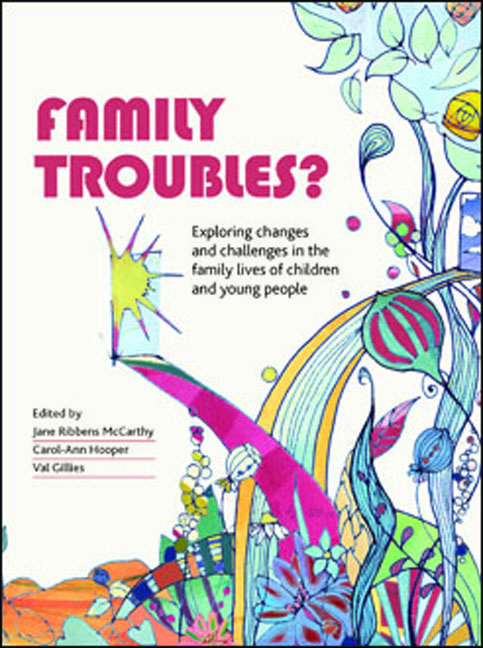Book contents
- Frontmatter
- Contents
- Notes on contributors
- Foreword
- Preface
- 1 Troubling normalities and normal family troubles: diversities, experiences and tensions
- Part One Approaching family troubles ? Contexts and methodologies :Introduction to Part One
- Part Two Whose trouble ? Conteste d definitions and practice: Introduction to Part Two
- Part Three The Normal, The Troubling And The Harmful?: Introduction to Part Three
- Part Four Troubles and transitions across space and culture: Introduction to Part Four
- Part Five Working With Families: Introduction to Part Five
- Index
18 - Families left behind: unaccompanied young people seeking asylum in the UK
Published online by Cambridge University Press: 07 September 2022
- Frontmatter
- Contents
- Notes on contributors
- Foreword
- Preface
- 1 Troubling normalities and normal family troubles: diversities, experiences and tensions
- Part One Approaching family troubles ? Contexts and methodologies :Introduction to Part One
- Part Two Whose trouble ? Conteste d definitions and practice: Introduction to Part Two
- Part Three The Normal, The Troubling And The Harmful?: Introduction to Part Three
- Part Four Troubles and transitions across space and culture: Introduction to Part Four
- Part Five Working With Families: Introduction to Part Five
- Index
Summary
Introduction
Every year, several thousand children and young people arrive in the UK to seek asylum without the care or support of parents or other family members and more such claims are made in the UK than anywhere else in Europe (European Migration Network, 2012). In 2009, for example, 2,990 asylum applications (just over 12% of all those registered in the UK) were from unaccompanied asylum-seeking children and young people claiming to be under the age of 18 (Home Office, 2010). Of these, only 11% were granted asylum, 16% were refused and the remainder (73%) were awarded discretionary leave, mostly until they reached the age of 17-and-a-half years old. Hence, the majority of young people arriving unaccompanied into the UK in search of asylum are judged not to meet the criteria of ‘persecution’, as defined within the United Nations Refugee Convention (1951), and consequently have no clear sense of how long they will be able to remain here.
This chapter considers the experiences of a sample of young people who arrived independently to seek asylum in the UK, having left families behind at some point in their journey. It traces the extreme turmoil and upheaval they experienced, often accompanied by the accumulated loss of loved ones, family and friends over time, and the consequent troubles that ensued for them. Central to young people's narratives, however, was what we have interpreted here as the notion of ontological security (Giddens, 1991): a sense that irrespective of upheaval and trauma, what helped mitigate the difficulties they encountered was an ability to reconstitute the predictability and routine of life and to envisage a future for themselves. We go on to show how their subsequent interactions with structures, systems and social environments once they arrived worked in contrasting ways to both re-establish and undermine young people's sense of ontological security and well-being.
Methodology
This research was conducted as part of a UK Department of Health-funded study into the factors affecting the emotional well-being of children and young people seeking asylum on their own in the UK and the implications for policy and practice. The qualitative interviews were carried out between January and July 2007, with a purposive sample of 54 unaccompanied children and young people accommodated (or previously accommodated) by local authorities in London.
- Type
- Chapter
- Information
- Family Troubles?Exploring Changes and Challenges in the Family Lives of Children and Young People, pp. 223 - 232Publisher: Bristol University PressPrint publication year: 2013

